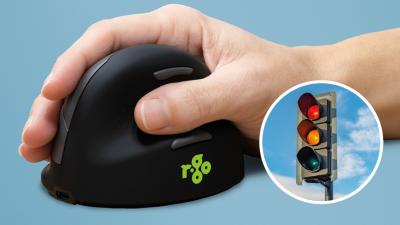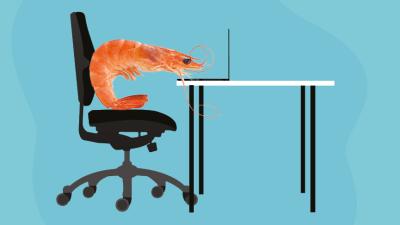
When workplace health and wellbeing specialists Posturite selected the Stroke Association as their chosen charity in 2022, they were excited to see the impact their 180 staff members’ fundraising and support could make.
Now, £118,000 later, Posturite Managing Director Chris Jones feels even more inspired to help fund the Stroke Association’s work after meeting with the scientists who are researching stroke and its devastating effects on the body.

He had the chance to meet neurology team members Shifa Hamdule and Professor Fenella Kirkham at the Great Ormond Street Institute of Child Health, part of University College London.
Professor Kirkham told him that stroke research receives relatively little funding sadly, yet there are 1.4 million stroke survivors in the UK.

Stroke in young people
Awareness that children can have a stroke tends to be low amongst the general public. Unfortunately, you can have a stroke at any age.

Following her MSc in Applied Paediatric Neuropsychology, Shifa Hamdule is undertaking research with people aged 18-40 who have had a stroke.
Her study is funded by the only charity in the UK providing lifelong support for all stroke survivors and their families, the Stroke Association. Shifa wants to understand the relationship between sleep, stroke and sickle cell anaemia in order to help improve the quality of life of young stroke survivors. She is looking specifically at sleep apnoea, a condition which interrupts breathing during sleep.

At her meeting with Chris Jones from Posturite, Shifa explained that sleep apnoea is common amongst people who have had a stroke, and is a risk factor for cognitive and psychological difficulties in young adults with stroke. “There are certain regions of the brain that support breathing, and are impacted by stroke.” People's mental and physical health can be severely affected, so it’s an important area to study.
“We're also looking at how oxygen is consumed in different parts of the brain. Through MRI images, we’re examining the microstructure of the white matter of the young people’s brains. Pulse oximeters will be sent to participants’ homes for them to wear for a night, and then we’ll receive the readings to analyse.”
Why is research into stroke vital?
“Research is vital if we are to effectively prevent, treat and support recovery from stroke” reports the Stroke Association’s research team. “Every year in the UK, around 100,000 people have a stroke, and that number is going up. Some lose their speech. Some lose their independence. And some lose their lives.”
The Posturite team is incredibly motivated to help fund stroke research projects like the UCL study, and more funding is desperately needed.

People who donate to the Stroke Association help a vibrant community of stroke researchers in the UK to make a difference to people’s lives. In 2024, Posturite also sponsored the UK Stroke Forum, a major multidisciplinary conference where stroke care professionals share knowledge and innovations in stroke prevention, treatment, and rehabilitation.

Is stroke research really underfunded?
“Stroke research is one of the most underfunded areas of healthcare research in the UK” comments Dr Gargi Banerjee in an emotive video about stroke research. The Stroke Association combines research funding with a mission to make stroke research truly person-centred. This charity is the driving force ensuring stroke research delivers real-world benefits for stroke survivors.
When meeting Posturite, researcher Shifa Hamdule explained that she has been doing a wide literature search and is very concerned about how little research there is out there on young peoples’ strokes. She is determined to help change this, and points to evidence that the occurrence of stroke in young people may be increasing.

For example, between 2002-2010 and 2010-2018, the Oxford Vascular Study found that there was a 67% increase in stroke incidence among younger adults aged under 55.
Acting FAST when you think someone may be having a stroke

The FAST acronym stands for ‘Face, Arms, Speech, Time’ and helps you to quickly identify the three most common signs of stroke:
- Face weakness: Can the person smile? Has their eye or mouth drooped?
- Arm weakness: Can the person fully raise both arms and keep them there?
- Speech problems: Can the person speak clearly and understand you? Is their speech slurred?
- Time to call 999: if you see any one of these signs.

Martin Green, Posturite’s Operations Director, says ‘FAST’ helped him to realise that a supervisor was having a stroke once during a meeting. “I’ll never forget it – his face started changing and I remembered the ‘Face drooping’ part of FAST”. Martin and colleagues quickly called 999 and the speedy treatment that his colleague received made a monumental difference to his stroke recovery. Martin was there to meet Shifa Hamdule and Professor Fenella Kirkham at UCL too, and was moved by the opportunity to support their work.

Professor Kirkham was actually an expert guest on TV’s ‘Good Morning Britain’ this year, telling people about how to Act FAST if they suspect a stroke. “Time is really crucial in terms of recovery and in terms of the brain not being permanently damaged” the professor explains. She was accompanying a young woman on the TV show, who described the trauma of her stroke at the age of only 34, but who managed to get urgent medical care very quickly.
Factfile on the charity corporate partnership between Posturite and the Stroke Association

- Posturite staff volunteer as Weekly Volunteer Callers, a connect and chat service, talking to people affected by stroke.
- Each January, Posturite customers help raise thousands of pounds during the Support Stroke Sale. Posturite donates 10% of the value of all sales of ergonomic equipment to the Stroke Association throughout the promotion, raising £38,431 so far.
- Fiona Muir, Chris Pratt and Andrew Walkington from the Posturite team have all run the gruelling 26.2 miles of the London Marathon in aid of the Stroke Association, raising £8,424.
- Posturite won the Business Charity Award for Employee Engagement in celebration of their energetic corporate fundraising for the Stroke Association.
- The first Posturite #PedalForStroke featured just 3 riders, increasing to 18 in 2025! Keen cyclist and MD Chris Jones leads the Posturite Pedal for Stroke every year and the event has now raised over £44,202 for the Stroke Association. Monumental support from generous sponsors including Fellowes, Flokk, TVS Supply Chain Solutions, Bakker Elkhuzien and MDK have made this happen.

- The Posturite webinar My job is important to me: Working after cancer or stroke was an emotive event featuring stroke survivor Nick Hounsfield, founder of the inland surfing destination 'The Wave', and Josh Murphy from the Stroke Association. Josh trained employers on how best to support employees after a stroke.
Healthy active lifestyles and stroke risk reduction

Being more active is one of the lifestyle changes recommended by the Stroke Association to help reduce your risk of stroke.
This approach aligns with Posturite’s mission to encourage active working, because to #MoveMoreWorkBetter is healthy for us physically and mentally.
“Mobility is crucial for everybody to help prevent stroke and then to help your rehab” comments Professor Kirkham.
Stroke research makes a real difference
Posturite’s Chris Jones sums up:
“Most of us in the Posturite team know someone who has been affected by stroke. Stroke research makes a real difference in saving lives, reducing disability, and improving quality of life. It means a great deal to us at Posturite to support it. Today we’ve seen where some of the money we’ve raised for the Stroke Association has been spent, and that’s been fantastic. Thank you to the stroke researchers doing this amazing work.”

Researcher Shifa Hamdule continues to recruit stroke survivors who would be interested in taking part in her UCL study. If you're aged between 18 and 40 and have had a stroke, please email [email protected]. Thank you.
It will be World Stroke Day on 29 October 2025, so why not join Posturite in raising awareness of stroke? You can help your colleagues learn about stroke using the Stroke Association’s free #WorldStrokeDay resources.
If you would like to contribute to the Stroke Association’s work, every donation is gratefully received.












